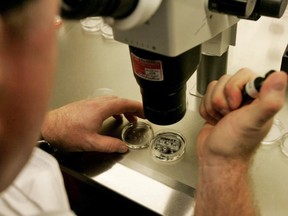Science
Scientists Transform Skin Cells into Fertilizable Eggs for First Time

Scientists have achieved a groundbreaking milestone by converting human skin cells into fertilizable eggs and successfully fertilizing them in a laboratory setting. This achievement, announced on October 25, 2023, holds the potential to revolutionize reproductive options for individuals facing infertility, a condition that currently impacts approximately one in six people worldwide.
The research team, led by experts from the Oregon Health & Science University in the United States, cautioned that this technology, known as in-vitro gametogenesis (IVG), is likely still years away from practical application for aspiring parents. Paula Amato, a co-author of the study published in the journal Nature Communications, expressed optimism about the implications of this research. “If successful, it could enable older women or those lacking eggs due to various reasons to genetically reproduce,” she noted.
The advancement also opens avenues for same-sex couples to have children genetically related to both partners, which Amato highlighted as a significant benefit.
Breakthrough in Reproductive Biology
In recent years, there have been significant advances in reproductive science. Notably, Japanese researchers reported in July that they had successfully created mice with two biological fathers. The current study represents a substantial leap forward, as it utilizes human DNA rather than that of animals.
The process involved removing the nucleus from standard skin cells and transferring it into a donor egg that had its nucleus removed. This technique, known as somatic cell nuclear transfer, was previously used to clone Dolly the sheep in 1996. A challenge arose, however, because skin cells contain 46 chromosomes, while eggs require only 23 for successful fertilization.
To address this, the researchers developed a method called “mitomeiosis,” which mimics the natural chromosomal division that occurs during reproduction. This innovative approach led to the creation of 82 developing eggs known as oocytes, which were subsequently fertilized using in vitro fertilization (IVF). After a period of six days, less than 9 percent of the embryos reached a stage suitable for transfer to the uterus, although many exhibited abnormalities, leading to the termination of the experiment.
While the 9 percent success rate was low, it is worth noting that only about a third of embryos typically reach the IVF-ready “blastocyst” stage during natural reproduction.
Future Implications and Ethical Considerations
Amato estimates that the technology may take at least a decade before it becomes widely accessible. “The biggest hurdle is achieving genetically normal eggs with the correct number and complement of chromosomes,” she explained.
Ying Cheong, a reproductive medicine researcher at the University of Southampton in the United Kingdom, praised the research as an “exciting” breakthrough. “For the first time, scientists have shown that DNA from ordinary body cells can be placed into an egg, activated, and made to halve its chromosomes, mimicking the special steps that normally create eggs and sperm,” Cheong stated. She emphasized that while this work is still in its early stages, it could significantly change our understanding of infertility and miscarriage.
Other teams exploring the creation of lab-generated eggs are utilizing different techniques, such as reprogramming skin cells into induced pluripotent stem cells. These cells have the potential to develop into any cell type, including eggs. Amato noted that it remains uncertain which method will prove more successful, but both paths indicate a long road ahead.
The researchers adhered to existing ethical guidelines in the United States concerning the use of embryos during this study, ensuring responsible research practices.
As this innovative research progresses, it may redefine reproductive possibilities for countless individuals and couples facing infertility challenges. The implications of this study extend beyond science, touching on deeply personal aspects of family, identity, and reproduction.
-

 Science3 months ago
Science3 months agoToyoake City Proposes Daily Two-Hour Smartphone Use Limit
-

 Top Stories3 months ago
Top Stories3 months agoPedestrian Fatally Injured in Esquimalt Collision on August 14
-

 Health3 months ago
Health3 months agoB.C. Review Reveals Urgent Need for Rare-Disease Drug Reforms
-

 Technology3 months ago
Technology3 months agoDark Adventure Game “Bye Sweet Carole” Set for October Release
-

 World3 months ago
World3 months agoJimmy Lai’s Defense Challenges Charges Under National Security Law
-

 Lifestyle3 months ago
Lifestyle3 months agoVictoria’s Pop-Up Shop Shines Light on B.C.’s Wolf Cull
-

 Technology3 months ago
Technology3 months agoKonami Revives Iconic Metal Gear Solid Delta Ahead of Release
-

 Technology3 months ago
Technology3 months agoApple Expands Self-Service Repair Program to Canada
-

 Technology3 months ago
Technology3 months agoSnapmaker U1 Color 3D Printer Redefines Speed and Sustainability
-

 Technology3 months ago
Technology3 months agoAION Folding Knife: Redefining EDC Design with Premium Materials
-

 Business3 months ago
Business3 months agoGordon Murray Automotive Unveils S1 LM and Le Mans GTR at Monterey
-

 Technology3 months ago
Technology3 months agoSolve Today’s Wordle Challenge: Hints and Answer for August 19









